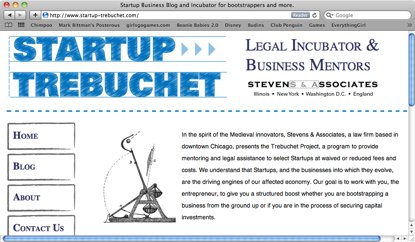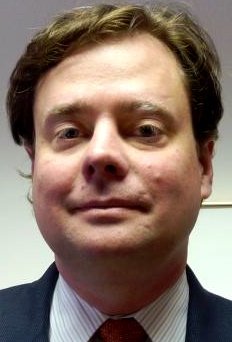 Tom Stevens, an attorney who owns a law firm in the Loop, is helping green entrepreneurs and other start-up mavericks beyond the typical pro bono work that many lawyers do. A former Illinois state tax prosecutor, Mr. Stevens hung up that hat 20 years ago to pursue a legal career in the U.S. and in the United Kingdom. He specializes in advising small to mid-sized businesses about finance, company formation and governance. He always liked to offer a bit of free advice that’s typical of many lawyers, but about four years ago he established a separate program within his firm — called Trebuchet — to formalize some of the free or reduced-fee mentoring he was keen to provide to worthy startups. Tom Stevens Mr. Stevens, 46, views his own work in a small law firm of five attorneys as entrepreneurial. The goal of the Trebuchet program within his firm is to share his entrepreneurial expertise with early-stage companies that may not have the financial means to get this kind of help. Mr. Stevens has worked with about 20 to 30 startups since the program’s inception. He’s recently expanded into the green sector. He heard a lot of green-minded start-up stories during the annual FamilyFarmed Expo last month in Chicago. Crain’s met with Mr. Stevens to talk more about Trebuchet. Crain’s: OK, so what does Trebuchet mean and how does it relate to the work you’re taking on in that program? Mr. Stevens: I’m a fan of really old technology. Trebuchet (pronounced “tre-bushay”) is a Medieval catapult. At the time, it was fearsome because the technology was beyond what anyone else had. It was absurdly accurate compared to anything else. The metaphor for helping startups, obviously, is that a catapult springs things forward. Originally, we just gave it the nickname Trebuchet, but it stuck. Now we even have a blog. We want this program to be a destination for people who could benefit from our help that otherwise might not be able to afford it at that point in their company’s formation. Crain’s: What type of companies would be good candidates for assistance in your program? Mr. Stevens: There are so many entrepreneurs with young ventures or ventures that have been around for a while that are suddenly faced with start-up-like activity. Oftentimes they don’t have the fiscal ability to secure help of attorneys, accountants or other mentors, especially in regulated industries, like the food industry. I met a lot of people at FamilyFarmed who need help. Most of these people are intelligent and really motivated, and they can get a lot of information online. But some stumble a bit and many professionals look at this as billing opportunities, and that’s appropriate. At this point in my legal career, I don’t need to earn money for every single thing that I do. I formed this program to waive those attorney fees. We don’t even take an equity stake in these firms we advise. I don’t think it’s ethical. Crain’s: What kinds of services do you provide to the selective companies you assist? Mr. Stevens: We look to give legal services for complete projects. If someone was entertaining angel or venture-capital financing, we’d represent them in the transaction. We might help come up with agreements among co-owners when the company is being formed. Sometimes disputes arise later when the company suddenly starts making money so it’s important to get the right ownership structures in place early on. We also might advise them to be careful of regulatory violations or structural problems. After 20 years, I’ve owned my own company and worked with many clients who own their own companies. Some have become wildly successful, and some have failed. So we want to provide mentoring and share our insight through what we’ve learned over time. Sometimes we help them identify opportunities to cultivate or corroborate their ideas to assure them they’re on the right track — or not. I spend about 10% of my time on these activities. Part of it is hands-on, and I’m on some of their boards, which helps me look at companies at a higher altitude as well. Crain’s: Have you worked with any local companies that you’d consider part of the emerging green economy? Mr. Stevens: At the FamilyFarmed Expo I met a lot of owners who are on a mission to have a company that is good for their family, but one that’s also good for other people’s health, their communities and the world. I really got a sense of that passion when I was there. Since the Expo, we’re having dialogues with about six new companies involved in urban agriculture. We’ve got a local client that’s come up with a lubricant for machinery that’s not petroleum-based, it’s a bio-based lubricant. I’ve also worked with a local renewable energy company working on wind turbine technology. What I really hope for is that there will be a confluence of technology entrepreneurs merging with green entrepreneurs. For example, there are lots of companies trying to go paperless, which is green, and technology entrepreneurs are developing Internet-based business models to help companies achieve hose goals. Lots of tech companies are now being perceived as green. The green space is an area where we strongly want to continue. Crain’s: What motivated you to start this program, and what kinds of rewards are you getting out of it? Mr. Stevens: When I came out of the government as a prosecutor in 1992, there were no mentors. You either swam or sank on your own, so now I want to help others that may not have the ability pay for it. I like the electric atmosphere of working with entrepreneurs, and I still see myself as one of them. Having a small company the way we do always gives us opportunities to innovate as well since we’re always learning from others. It keeps us agile, too. |
Judith Nemes

Judith on Twitter
-
Recent Posts
Archives
- September 2015
- July 2015
- May 2015
- April 2015
- March 2015
- February 2015
- January 2015
- December 2014
- November 2014
- October 2014
- September 2014
- August 2014
- July 2014
- June 2014
- May 2014
- April 2014
- March 2014
- February 2014
- December 2013
- November 2013
- October 2013
- September 2013
- July 2013
- June 2013
- May 2013
- April 2013
- March 2013
- February 2013
- January 2013
- December 2012
- November 2012
- October 2012
- September 2012
- August 2012
- July 2012
- June 2012
- May 2012
- April 2012
- March 2012
- February 2012
- January 2012
- December 2011
- November 2011
- October 2011
- September 2011
- August 2011
- July 2011
- June 2011
- May 2011
- April 2011
- March 2011
- February 2011
- January 2011
- December 2010
- November 2010
- October 2010
- September 2010
- August 2010
Categories
Tags
agriculture architecture building carbon clean-energy clean-tech CleanEnergyTrust climate construction design economy efficiency energy entrepreneurs environment events farming food gardens green Green Scene GreenScene homeowners investments law local-food locavore Nemes organic policy Polsky power recycling renewable renewable-energy residential restaurants retail retrofits solar startups sustainability tech water windBlogroll
Blogs
AutoBlog Green
Blue Marble Blog
Climate Progress
Climate Shifts
Coal Tattoo
Conscious Consuming
Cool Green Science, The Nature Conservancy
Dominion Energy's E-Conserve Blog
Environmental Economics
Forrest for the Trees
gGadget.org
GoodCleanTech
Green Business
Green Energy Reporter
Green Herring
Green Trust Sustainability
Groovy Green
Joel Makower
Livable Future Blog
Los Angeles Times: Greenspace
MapAWatt Blog
RealClimate
Reuters Environment Forum
Sustainablog
The Goat
The Inspired Economist
The Oil Drum
The Vine
World Changing
Consumers
Climate Ark
Green-e
Greener Choices
Grist
Jamble Magazine
MetroGreen+Business
National Geographic Green Guide
Solar Buzz
The Daily Green
Treehugger
Institutions
DOE: Office of Energy Efficiency and Renewable Energy
Energy Star
European and Chicago Climate Exchanges
European Commission Directorate General for Environment
European Federation for Transport and Environment
International Energy Agency
National Renewable Energy Laboratory
United Nations Environment Program
United Nations Framework Convention on Climate Change
US Department of Energy
News Sources
Alternative Energy Investments
Alternative Energy News
BBC News: Global Climate Change
Clean Edge, Inc.
Climate Biz
Climate Change News Digest
CNet: Green Tech
Consumer Reports: Greener Choices
Environmental News Network
Green Business News
Green: From the Washington Post
GreenBiz.com
Greentech Media
Greenwire
Grist
High Country News
Point Carbon
Renewable Energy World
The Environment Report
The Green Blog
Yale Environment 360
Organizations
American Wind Energy Association
Association for the Study of Peak Oil
Carbon Disclosure Project
Climate Matters @Columbia
Environmental Defense
Friends of the Earth
Independent Energy Producers Association
Interstate Renewable Energy Council
Johns Hopkins Center for a Livable Future
Natural Resources Defense Council
Rocky Mountain Institute
Solar Energy Industries Association
Sustainable Buildings Industry Council
The Pew Center on Global Climate Change
The Post Carbon Institute
United States Energy Association

